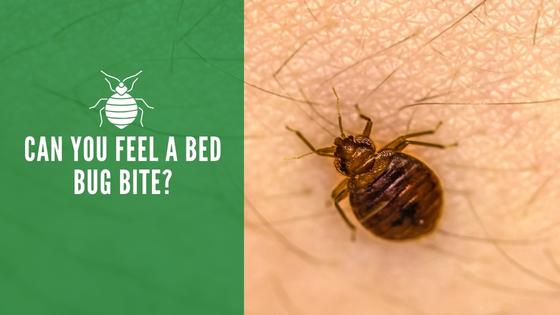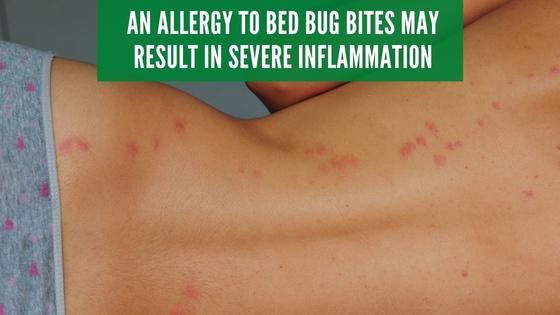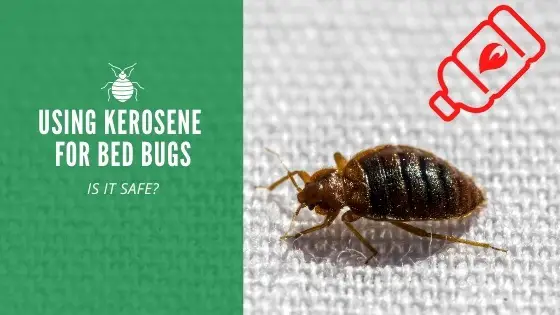Can You Feel a Bed Bug Bite?

Just the thought of tiny insects feeding on your blood at night sounds like the makings of a nightmare. While most pests attack during the day, bed bugs get you when you are most vulnerable. But don’t worry, you won’t feel it until later, which shows how sneaky these insects are at accessing their food.
How Do Bed Bugs Bite and Why Can’t You Feel It?
Given their tiny size, you can probably already suspect that their mouths won’t be that big. Bed bugs don’t have teeth like we tend to think of them. Instead, they have structures in their mouths called stylets.
These stylets are thin, sharp, and designed to easily pierce the skin without people noticing. As the stylets enter the skin, the bed bugs inject an anesthetic that numbs the area so that you won’t wake up.
The insect also injects an anticoagulant, or blood thinner, as they feed. This makes it easier for them to eat, and it makes it even harder for you to notice strange sensations that would possibly wake you up. It is also quite difficult to feel bed bugs crawling on your skin at night.
How Do You Know If You Have Been Bitten By Bed Bugs?
Approximately 30% of people might not ever develop a reaction to bed bug bites, which is why infestations are often in full force before someone realizes that there is a problem.
If you do develop symptoms from the bites, then you’ll usually notice marks on your skin that resemble what you see from mosquitoes and other biting insects. Usually, these bites are on parts of your skin exposed as you sleep, such as your face, arms, and feet.
One telltale sign that you have bites from bed bugs is that they may appear in a line of three or four. This shows where the bug fed and moved again before resuming their feeding. Keep in mind that this doesn’t always happen. Multiple bugs can leave bites scattered at various sites on your body.
Since the bites may look like they are from other insects, you might need to do some detective work to find out what is going on. If you haven’t been outside where mosquitoes or biting flies might live, you should suspect your sleeping environment could be involved.
Discovering an assortment of bites soon after traveling and staying in a hotel room or bringing used furniture into your home is another sign that the bites could be from bed bugs.
How Soon Do Bed Bug Bites Show Up?
In most cases, the red marks from your skin’s reaction to the bite will show up within two to three days. However, you might notice a constantly increasing number of bites if an undiscovered infestation occurs in your home.
When Do the Bite Marks Go Away?
You can expect to live with the irritating bites for a week or two most of the time. Like other bug bites, you’ll usually find the first few days the itchiest. Then, the redness and irritation will fade until the marks are completely gone.
Leaving the bites alone as much as possible helps them go away faster. Scratching can reignite the histamine response in your skin. Plus, those scratches could cause abrasions that lead to scarring.
Can Bed Bug Bites Develop Complications?
Scarring isn’t the only problem to worry about. Some unlucky individuals are especially allergic to bed bug bites, which can cause them to develop a serious rash.
An allergy to the bites typically presents as more severe inflammation and swelling at the site than you would expect from a normal insect bite. This can also further progress to a rash that contains fluid-filled bumps that spread across the skin.

A spreading rash could also be a symptom of a bacterial infection. These can occur from bacteria entering the skin during the bite, or excessive scratching could introduce bacteria to the wound. This is a sign that you need to seek prompt medical attention in either case.
In very rare instances, an allergy to the bites can lead to asthma and anaphylactic shock. Someone who presents with bite marks, breathing difficulties, low blood pressure, or other concerning symptoms needs emergency medical care.
Although these kinds of bites are often viewed as a physical health issue, you don’t want to overlook the importance of your mental health. Waking up to fresh bites and the awareness that insects are feeding on you can be mentally debilitating.
You could also suffer mental distress from the constant itching of the bites or the emotions that come from dealing with an infestation. The fear of receiving more bites could cause you to struggle to sleep at night.
If you experience anxiety, depression, or other mental health symptoms, reach out to a professional. You might need brief counseling to help you address your mental health concerns and move forward emotionally from handling the infestation.
How Do You Care for Bed Bug Bites?
The most important thing you can do for bed bug bites is to avoid scratching them. They’ll usually fade out on their own without any major complications.
People who experience distracting levels of itchiness might choose to use an antihistamine creme to alleviate the symptoms. Your doctor might also recommend an antibiotic to help you treat any infections that develop.
Other than that, you’ll want to keep your skin where the bites exist clean and dry. Keeping them loosely covered by wearing long sleeves or pants can further help to prevent them or stop people from asking too many questions when you’re out in public.
When Should You Call an Exterminator?
If you’ve found a few mysterious bites on your skin that can’t be pinned down to other types of insects, then you might need to do some inspecting around your bedroom.
You can usually find bed bugs around the seam of your mattress, but they could migrate away to other places, such as the headboard or the nearby carpet. These infestations spread rather quickly, so spotting even a single possible sign of one is all it takes to require a call to the exterminator.
Calling for a professional inspection can also help you find infestations in the earliest stages where you might not easily see the bugs or their eggs. In the best-case scenario, you could even find out that you don’t have an infestation. Either way, you’ll be able to get prompt reassurance that your sleeping environment will be free of biting insects so that you can once again enjoy peaceful dreams.



